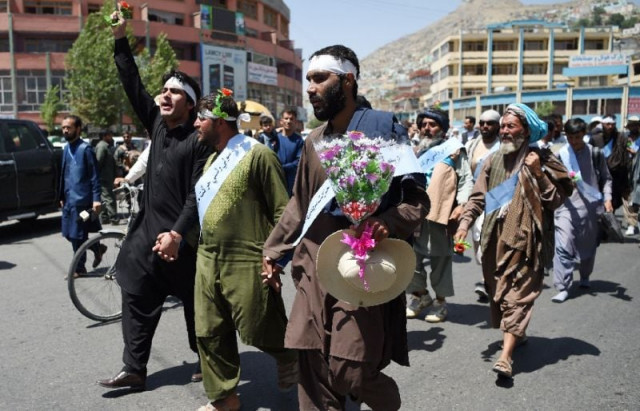Humanity vs ego — whither Afghanistan
In the first six months of 2019, American and Afghan airstrikes killed and injured 519 people

Afghan peace activists shout slogans demanding an end to fighting as they arrive in Kabul. PHOTO: AFP
A New York Times report published on September 12 suggests that the number of American airdropped missiles and bombs in Afghanistan is set to meet or possibly outpace the 7,362 munitions launched in 2018. The most ordnance dropped before 2018, according to Air Force data compiled since 2006, was in 2011 at the height of American military presence in the country with 5,411 munitions.
The recent uptick in air support is not without cost to civilians on the ground. In the first six months of 2019, American and Afghan airstrikes killed and injured 519 people, according to a United Nations report, amounting to a 39% increase from the same time period last year, the report said.
Unfortunately the Afghan War has now entered its 44th year, if we count the first Soviet intervention in 1976. Afghans have lost two generations in these egoistic wars, a total loss in terms of casualties of 2.5 million. A whole generation of refugees is now living in Pakistan and Iran and don’t see any hope in the future — and yet we are calculating the pros and cons of a US withdrawal. Is a period of 18 years not enough to test a policy or military strategy? In military parlance, we heard of the “dilution of forces in space”, like Operation Barbarossa and the dilution of Hitler’s Panzers in the vast steppes of Russia. In Afghanistan, we are witnessing the dilution of the most powerful military in time. Whether we like it or not, 18 years is long enough and instead of torturing and experimenting on the Afghans, the world should let them sort out their problems and at least think of the third generation of Afghans now being born in the shanty huts and refugee settlements in Iran, Pakistan and villages of Afghanistan. Let humanity prevail.
Even US netizens are getting tired of this long war and are weary of the daily pep talks and expressions of bravado by US military commanders and the State Department that are issued on Afghanistan. One of the commentators remarked on the US military mission, “Horse crap, WHAT MISSION? We have been there 20 years and the ‘mission’ is still a mystery. The only real beneficiary is the Military-Industrial Complex, which has sucked our treasury dry with no real results. Every dime spent there and every life lost there has been wasted. NOTHING has really been accomplished.” Another said, “Yes, also known as ‘mission creep’, a fatal malady of many military missions. Nowhere in our Constitution does it mention a responsibility to reform governing in other countries. And, after 18 fruitless years, does the goal of reducing terrorist threats to the USA appear in any realistic assessment of the future. If anything, this is a job for the State Department, not the War Department. Just get out. NOW.”
The most interesting comment under a Washington Post article by Charles Clay on September 15 stated, “Gentle reader, your GWOT (Global War On Terror), sired by President G. W. Bush, will become 18 years old next Friday. GWOT will be old enough to vote. You have contributed trillions of dollars to GWOT’s health, money that might have been spent more wisely on health care or infrastructure. Too, many of you have sacrificed your children so GWOT could flourish. If you are planning a birthday party for GWOT, I hope you have fun. And maybe have a kind thought or two for the Afghan people who were your hosts for your first battles of GWOT. Some of them even survived GWOT’s embrace”.
President Trump had most probably foreseen the public mood and made an election promise to bring back American soldiers home before his re-election bid in 2020. We feel that it was based on a sound strategic assessment and the mere fact that these wars in West Asia and the Middle East have cost more than $4 trillion to the US taxpayers. Any sane policymaker or statesman will look at these figures and compare it with strategic gains; in case of the Afghan War, it’s almost zero. With the Taliban controlling more than 60% of Afghanistan and contesting in the leftover (mainly the six largest cities), no field commander in Afghanistan will vouch to continue this war.
Hedging is normal in such situations where belligerents try to maximise their gains in the last phase of the war. The Taliban are doing that to improve the bargaining chip, so is the National Unity Government (NUG) forces.
Finally, where do we go from here?
Scenario 1: The Trump vs Taliban rhetoric becomes a reality and another phase of war starts in Afghanistan, resulting in massive civilian casualties but no change on the ground. Meanwhile, the US uses more air-delivered ordnance, the Taliban step up attacks in urban centres across Afghanistan. Trump’s presidential election is fought with a new narrative of bravado and hard power. However, the end of 2020 finds both sides back on the negotiating table to restart peace talks.
Scenario 2: Sense prevails and both sides compromise for the sake of avoiding further bloodshed. Peace negotiations restart in earnest and hostilities cease ushering in a new dawn of peace in Afghanistan. President Trump enters 2020 with a fulfilled promise and wins his next election.
Published in The Express Tribune, September 21st, 2019.
Like Opinion & Editorial on Facebook, follow @ETOpEd on Twitter to receive all updates on all our daily pieces.















COMMENTS
Comments are moderated and generally will be posted if they are on-topic and not abusive.
For more information, please see our Comments FAQ